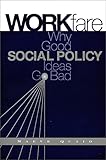Workfare : Why Good Social Policy Ideas Go Bad / Maeve Quaid.
Material type: TextPublisher: Toronto : University of Toronto Press, [2002]Copyright date: ©2002Description: 1 online resource (256 p.)Content type:
TextPublisher: Toronto : University of Toronto Press, [2002]Copyright date: ©2002Description: 1 online resource (256 p.)Content type: - 9780802081018
- 9781442683655
- 362.5/8/0971
- HV105 .Q35 2002eb
- online - DeGruyter
| Item type | Current library | Call number | URL | Status | Notes | Barcode | |
|---|---|---|---|---|---|---|---|
 eBook
eBook
|
Biblioteca "Angelicum" Pont. Univ. S.Tommaso d'Aquino Nuvola online | online - DeGruyter (Browse shelf(Opens below)) | Online access | Not for loan (Accesso limitato) | Accesso per gli utenti autorizzati / Access for authorized users | (dgr)9781442683655 |
restricted access online access with authorization star
http://purl.org/coar/access_right/c_16ec
One of the greatest, as well as the most debated, social policy ideas of the 1980s and 1990s was workfare. In Workfare: Why Good Social Policy Ideas Go Bad, Maeve Quaid delves into the definition and history of workfare, and then continues with a critical and comparative analysis of workfare programs in six jurisdictions: three American (California, Wisconsin, New York) and three Canadian (Alberta, Ontario, New Brunswick). Drawing from these case studies, Quaid develops an analytic model that illustrates how workfare falls prey to a series of hazards whereby good social policy ideas fail. Their demise, argues Quaid, begins with politicians with a zest for big ideas but little interest in implementation, continues with short-sighted policy makers, resistant bureaucrats, cynical recipients, flawed evaluations, and is completed by fleeting and fickle public attention for these news stories. Quaid's identification and analysis of these hazards is especially valuable because the hazards can also be applied to innovation in any area of social policy, such as health-care, education, pension plans, child-care, and unemployment insurance.
Mode of access: Internet via World Wide Web.
In English.
Description based on online resource; title from PDF title page (publisher's Web site, viewed 01. Nov 2023)


